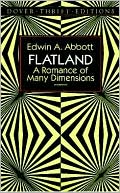Comments: I had heard of this book eons ago, but never ran across a copy until now (exploring T&B's library is always a highlight of our visits there). The story starts with the main character - a rectangle - explaining the basics of his flat world - a paper-thin world of length and width, but no height. He discusses what the inhabitants are like, how they live, and some of their history. In his world, people are geometric shapes: lower classes are thin triangles, with higher classes adding more and more sides (square, pentagon, hexagon, etc.) right up to the ruling classes, who are nearly circles. Homes are flat, multi-sided shapes with openings in the sides. He spends quite a bit of time explaining how they learn to recognize each other, given that, in a totally flat world, you observe everyone and everything from an edgewise viewpoint only, and thus see only straight lines.
Once you've wrapped your mind around that, the real gymnastics begin. The Flatland narrator encounters folks from Lineland, a one-dimensional world where everything exists along a single straight line. You can almost feel the frustration as the Flatlander tries to explain to the Linelanders that what they're seeing isn't all there is. The conversation is captivating and even amusing, but alas, the differences are too profound, and the Linelanders are never able to comprehend.
Then, in a later chapter, the Flatlander meets someone from Spaceland, a 3-dimensioned world like ours, who likewise tries to explain to him how much he's missing. The conversation goes much the same: "I'm not a circle, I'm a sphere"... "what's a sphere?"... "it's like a circle, but it has length, width and height"... "what is height?"... etc. So, the Flatlander ends up being on both the giving and the receiving end of futile attempts to explain an extra dimension that the other person has never experienced.
So, it's interesting and fun, but is it worthwhile? What struck me while reading is that maybe it's not so far-fetched. Here we are, living in three dimensions - four, if you include time. If there were Someone who lived outside those dimensions, perhaps a Being unconstrained by time, would we be able to really comprehend that? This book suggests that we'd have a hard time; we might accept the truth at face value, but we'd have great difficulty grasping what it really meant. As a result, we'd be puzzled by things like predestination, infant salvation and eternal security - all of which are problematic to our time-constrained way of thinking, but for Someone who resides entirely "outside" of time, they'd be complete non-issues.
Pretty deep stuff from an 80 page, 120-year old book.



